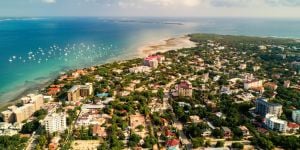
If you are planning on relocating to Tanzania, it is a good idea to read up on relevant information around the Tanzanian labour market. Most of what you will read in this article reflects change that at least in part can be attributed to an increasing urbanisation, especially the youth who are moving to the denser cities where more job opportunities are present. This article will outline the general work climate of the country, popular over-and under-resourced sectors, and will also provide links for further reading.
Work climate
Tanzania has experienced rapid economic growth over the past decade, with associated steady increases in the labour productivity. Income distribution equality is improving - an issue common to Tanzania and many other African countries - and the number of working poor has dropped dramatically. Comparatively to these countries, however, Tanzania's GDP (Gross Domestic Product) is very low. In addition, the country's volatile inflation rate has affected the real wages' purchasing power.
The country has a high incidence of under-education, which is at least in part the reason that only 15% of the labour force operates in the formal economy. The other 85% operate in the informal economy, and the overall employment rate has decreased in recent times. Unemployment rates are not terrible in Tanzania; however, what is more of a problem is the mismatch between the requirements and necessary qualifications for a job and the level of education a job-seeker typically possesses.
Another issue that is prevalent is gender-based discrimination, particularly when it comes to wages and labour protections.
Agriculture
Employment in this sector has significantly decreased, with workers rather entering into the services and even industry sectors. Changes in the industry sector are reflecting a move in the direction towards economic transformation; however, this is not happening fast enough. There needs to be more jobs offered in the industry sector, as most can still only find lesser-paid, lesser-productive jobs in the service sector.
Industry
Industry accounts for approximately a quarter (26%) of Tanzania's GDP. The government is particularly interested in developing this sector and is investing budget and planning regulations accordingly. This sector is comprised of manufacturing (40% of this is food and beverage), construction, and the flagship of the sector: mining.
Not only is Tanzanite found in Tanzania, but also gold, silver, iron, copper, nickel, uranium, and even diamonds! In addition, cement, graphite, limestone and coal are all extracted in the country. Tanzania is actually the 4th largest producer in Africa and produces around 40 tons per year. This figure makes up a significant percentage of Tanzania's exports, along with precious stones, diamonds, coffee, cotton, cashew nuts, tea, tobacco and more.
Did you know?
As indicated in the name, Tanzania is the only country where one can find Tanzanite!
Service
In 2015, services accounted for close to half (42.8%) of Tanzania's GDP. The private sectors that have been growing most rapidly are information and communication (ICT), financial and insurance activities, as well as transport and storage.
With its abundant natural resources, wildlife, fauna and flora, tourism is relied upon heavily to diversify Tanzania's economy. This sector receives a high amount of foreign investment, and the country is rapidly discovering its potential through touristic services. Many locals and expats alike find employment in nature reserves and parks, hotels and other guest accommodation, and many related touristic services such as tour guiding, driving shuttles, boats, and so on.
Useful links:
Labour Market Profile for Tanzania
Better labour market information systems
More about the industrial sector
We do our best to provide accurate and up to date information. However, if you have noticed any inaccuracies in this article, please let us know in the comments section below.








